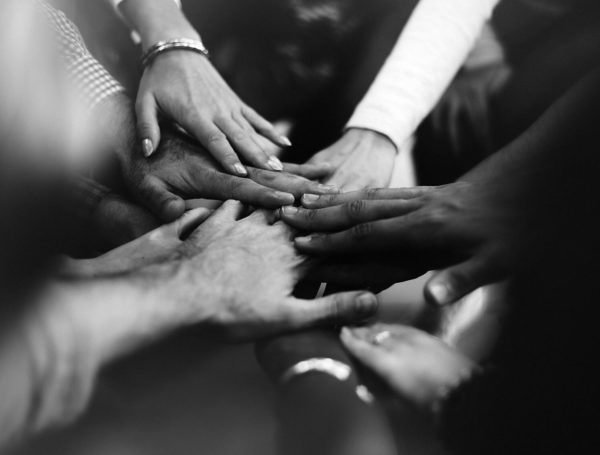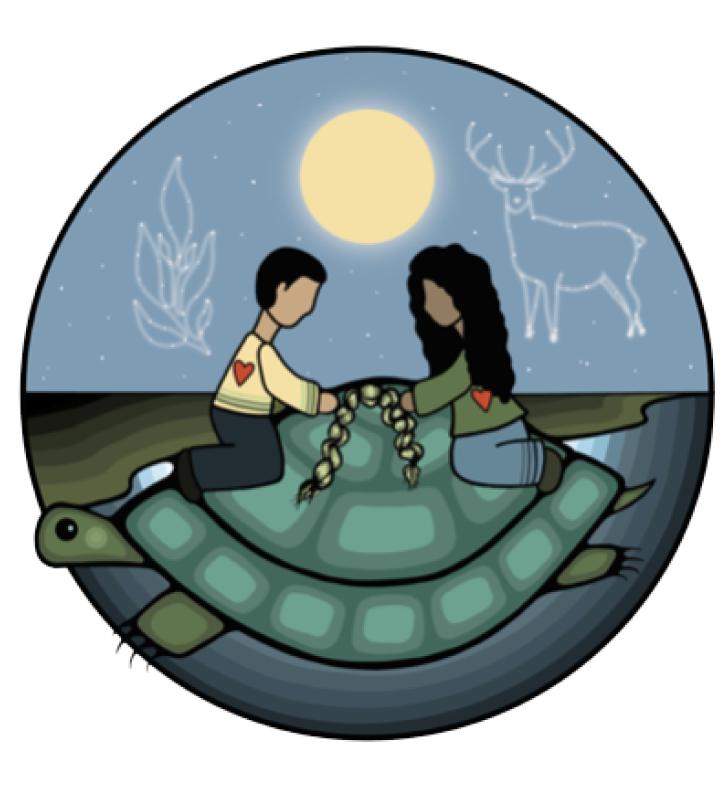Weaving Ways of Knowing
Introduction to
weaving in a good
way
Weaving in a Good Way
Western scientists are increasingly calling on Indigenous expertise to inform environmental monitoring, research, and policy, recognizing that approaches dictated by Indigenous laws, values, and knowledge systems have a proven and critical role in protecting biodiversity and entire ecosystems, worldwide. However, current attempts to include Indigenous Knowledge in environmental work are often extractive, minimizing sacred knowledge to singular datapoints, forcing Indigenous Knowledge into Western scientific frameworks, or using Indigenous Knowledge as a means to supporting Western-scientific frameworks. Developing approaches to environmental monitoring and research that truly respect multiple knowledge systems requires acknowledging Indigenous Peoples as rights holders, accomplished experts, and key decision makers, and placing an emphasis on culturally-sensitive, meaningful engagement in the research process.
Here, we provide 12 tips for environmental professionals, along with educational resources, to guide interactions across nations in a way that is meaningful and ethical. This list is not exhaustive, nor is it meant to be a check list that, once completed, ensures research is done in a good way. It is meant to provide resources that will start you on your own journey of education, self-reflection, and allyship.

12 Things to Consider
Understanding the context of the place and people you are conducting research with will ensure relationships are built on truth and mutual understanding. Learning about the “context” includes educating yourself on past and on-going impacts of colonialism, treaties and land claims, cultural norms, language, Indigenous law and governance structures, and the history of research in that area. Also, a willingness to learn about and participate in ceremony, traditions, and community events when possible. There is a wealth of resources out there to get you started.
Positionality refers to the stance, or positioning, of a researcher (or anyone) in relation to the social and political context of their research. It is important to understand how ones positionality – who you are, your connection to place and your community, your worldview, your motivations and intentions with your research, and your role in reconciliation – affects their research, from the questions they ask, to the information that is gathered, and interpretations of this information. This becomes really important in the context of cross-cultural research because dominance in can impact whose voices are represented in research outcomes and decisions.
Respectful, reciprocal, and trusting relationships are really the foundation of research done in a good way. Researchers need to shift away from the idea of “consultation” with Indigenous communities towards true “partnership”. This requires prioritizing relationship building throughout the research process; time, money, and energy should be devoted to communication, meaningful engagement, and face-to-face interaction. Many of the other tips on this page expand on what it means to build good relationships and meaningfully engage.
Identify the values that guide both you and your research partners, and let them guide your work. Indigenous Peoples are values-driven in their care for the land and relationships with all living beings; many nations speak to guiding values of respect (for all living beings), reciprocity (with the land and each other), humility (humans are not above other living beings), gratitude (for the gifts the land provides), and a responsibility to care for the land. Good research and environmental caretaking requires opportunities to cultivate and prioritize these values in personal and professional relationships.
Acknowledge that communities have their own priorities and seek to understand what those are, how to better support ongoing initiatives, and how to help build community capacity. Finding shared priorities and concerns will ensure that research is mutually beneficial to all partners. Some organizations, like Inuit Tapiriit Kanatami, have documents that outline their research priorities but, in other cases, this will require meaningful community engagement at the beginning of the research process.
Trust and good relationships take time. Resist institutional pressures to work faster than what all research partners need. Relationship-building requires all partners to spend time in the same place, listening to one another, exchanging knowledge, learning together. But, it is also important to understand that not all research partners work on academic calendars or timelines and time is needed to obtain community feedback and engagement.
Tokenism and “box-checking” can present as many things: asking someone to participate on a project outside of their area of expertise simply because they are Indigenous, reaching out to Indigenous researchers or communities after all of the important decision-making is done just to have Indigenous involvement on a project, asking individuals from one nation to speak for another, seeking Indigenous Knowledge only to default to Western scientific findings, and many more. Avoiding this comes back to ensuring research projects are founded in good relationships, shared priorities, and meaningful engagement throughout the entire research process.
It is critical to understand that Indigenous Peoples are not one, homogenous nation, and that Indigenous individuals or communities do not speak for all Indigenous Peoples. It is also important to note that Indigenous Knowledge is place- and context-specific, reflecting unique, local observations, and are accumulated through generations of lived experience and particular relationships with the land. Therefore, knowledge that is shared by one individual, community, or nation cannot be separated from the people and places that hold and/or practice it.
Informed consent and trusting relationships require transparent and accessible communication, which should be prioritized throughout the research process. International, national, institutional ethical guidelines stress the importance of obtaining consent and conducting ethical research, but fail to specify methods for doing so in accessible and culturally relevant ways. It is also important to note that, while research ethics approvals are required by most academic and research institutions, approval should also be obtained from local governments, organizations, and individuals participating in the research. Many organizations have Ethical Research Guidelines that help outline principles for ethical engagement.
Research outcomes should reflect all information that was obtained throughout the research process. If knowledge systems do not align, Western Science should not be considered the default “correct” answer, but all perspectives should be reflected. In fact, divergence in knowledge systems can provide opportunities to explore why knowledge systems do not align, potentially providing more insight into the initial research questions being asked.
It is important to reflect on who will own the information obtained from research projects, and ensure that decisions related to data ownership and sharing are transparent and documented. There are guidelines and principles available to help understand how data should be collected, protected, used, or shared in the context of research with Indigenous Peoples (e.g., OCAP, which stands for Ownership, Control, Access, and Possession).
If you commit to working with Indigenous Peoples in a research context, then commit to being a good ally. Your work is not done once a research project is completed. Go beyond the superficial. Devote time and energy to pushing boundaries within colonial institutions, use your platform to create space for Indigenous Peoples, respect Indigenous self-determination and sovereignty, and make sure allyship is an on-going process.




